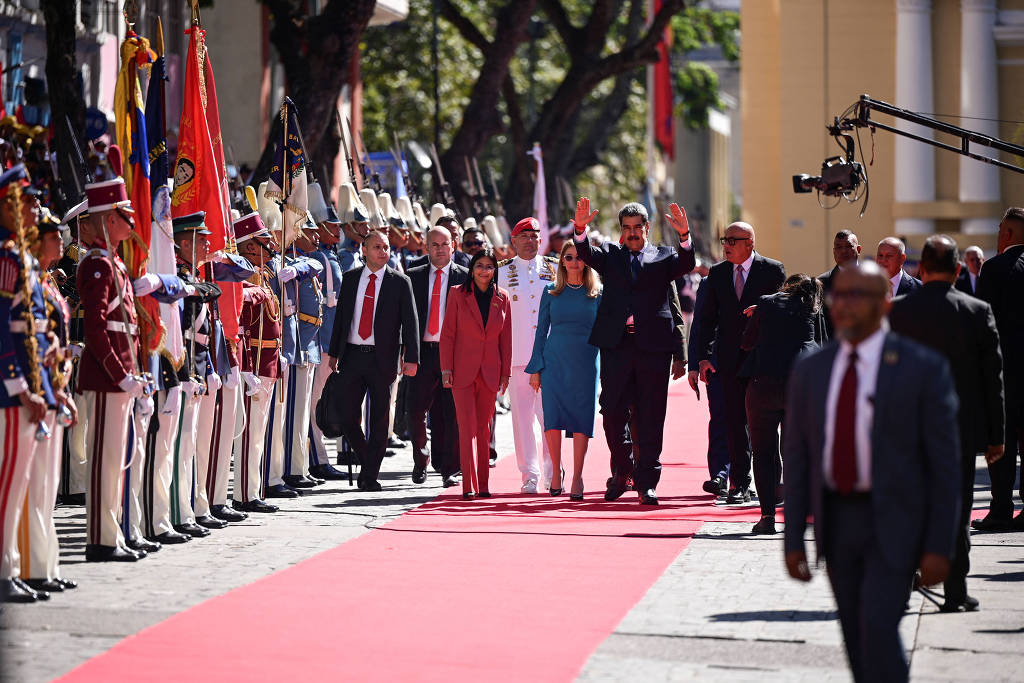
Published 01/10/2025 16:18 | Edited 01/10/2025 16:22
The president of Venezuela, Nicolás Maduro, was sworn in this Friday (10) for a new six-year term, after winning the July 2024 presidential elections with 51.2% of the votes, as declared by the National Electoral Council (CNE ). The ceremony took place at the National Assembly, in Caracas, with the presence of delegations from 125 countries and international organizations, in an event that reaffirmed the continuity of the Bolivarian project initiated by Hugo Chávez.
Maduro took the oath on a copy of the Bolivarian Constitution, signed by Chávez, and received the presidential sash along with the necklace that symbolizes the keys to the sarcophagus containing the remains of Simón Bolívar. After the formality, the president signed the act that makes his inauguration official and began the speech that marked the celebration of Venezuelan resistance in the face of international pressure and internal challenges.
Speech of resistance and sovereignty
In his speech, Maduro praised the historic resistance of the Venezuelan people against colonialism and imperialism, reiterating his government’s commitment to national independence. “The power I have emanates from the people, not from foreign governments”, declared the president, in a clear criticism of the sanctions imposed by countries like the United States and the destabilization attempts promoted by the far-right opposition.
Maduro also reinforced the legality of his mandate. “The Constitution of Venezuela, which guarantees the National Democratic State of Law and Justice, was written by the people, approved by the people, defended by the people,” he said.
He highlighted that Venezuela will hold three elections in 2025, including the choice of new representatives of the National Assembly, as part of a commitment to the country’s democracy and sovereignty.
In a blunt speech, the president denounced the support of the international right for attempts to interfere in Venezuela, mentioning Argentine president Javier Milei as “head of a global conspiracy” against the country’s sovereignty. “They could not impose a president and they never will be able to,” said Maduro.
International presence and popular support
Nicolás Maduro’s inauguration was attended by representatives from 125 countries and international organizations, in addition to more than two thousand delegates who participated in the Great World Anti-Fascist Festival, held parallel to the ceremony. Popular movements also mobilized in Caracas, with caravans that filled the streets of the capital to express support for the president.
During the ceremony, Maduro made a point of greeting peasants, fishermen, feminist groups and community organizations, reaffirming the government’s commitment to popular sectors. “This ownership belongs to the people”, declared the president, highlighting that popular participation is the basis of the Bolivarian project.
The celebration was also marked by music and culture, with an intense agenda of activities that involved political debates and artistic demonstrations. Maduro highlighted that popular mobilizations represent the vitality of Venezuelan democracy and resistance to destabilization attempts promoted by the opposition and its international allies.
“Seven Transformations” and the future of the country
Maduro took advantage of the inauguration ceremony to announce the launch of a constitutional reform process, which seeks to update Venezuela’s Magna Carta, promulgated 25 years ago. The president highlighted that the reform will be carried out with broad popular participation, reaffirming the democratic character of his government.
The president also presented the “Seven Transformations” plan, which will be the axis of his new term. The program includes the construction of a new productive economic model, the promotion of science and technology, the consolidation of national defense and the fight against global warming, in addition to initiatives to strengthen popular power and expand Venezuela’s international relations.
Maduro reiterated that the implementation of the “Seven Transformations” will be based on the “Plan for the Homeland”, which is the result of collective construction. He highlighted that the plan aims to guarantee social well-being and face the challenges posed by international sanctions.
Criticisms of the role of international media
During his speech, Maduro also criticized the dissemination of fake news about Venezuela by the international media, which, according to him, tries to divert attention from the country’s advances. “There is a communicational universe of duplicity: on the one hand, the cognitive laboratories that create fake news; on the other, the real Venezuela, which celebrates its sovereignty”, stated the president.
He also condemned the disinformation campaigns promoted by the opposition, accusing it of manipulating public opinion to justify violence and instability in the country. Maduro reaffirmed that the government will continue to work to consolidate peace and stability in Venezuela.
“I will fulfill all obligations of the Constitution and the laws of the Republic. This new presidential period will be a period of peace, prosperity, equality and new democracy”, he said.
Challenges and promises
Nicolás Maduro’s inauguration takes place at a time of great international pressure, marked by the 930 sanctions imposed against the country by foreign powers. Despite this, the president promised a new period of “peace, prosperity, equality and new democracy”, pledging to deepen the Bolivarian legacy and strengthen national independence.
With a consolidated popular base and significant international support, Maduro begins another term as one of the main bastions of the Bolivarian Revolution in Latin America, facing internal and external challenges with the promise of building a more just and sovereign future for Venezuela.
Source: vermelho.org.br

